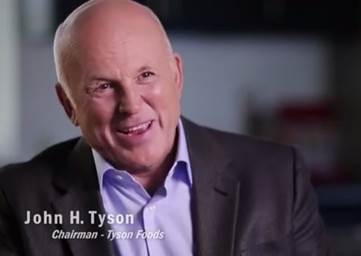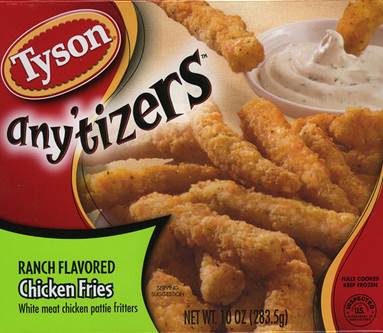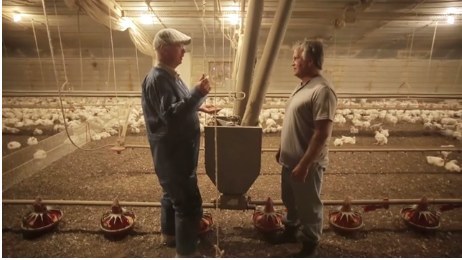NOBULL: Tyson Foods Chairman Joins Billionaires Club, While Wages For Chicken Farmers Wane
Tyson Foods Chairman Joins Billionaires Club, While Wages For Chicken Farmers Wane
Tyson’s stock price is way up, elevating John Tyson to billionaire status as a result. But many of the farmers raising the chickens and livestock used by the company and others in the industry continue to struggle. posted on May 13, 2014, at 11:35 a.m.
Deena Shanker BuzzFeed Staff
John Tyson, the chairman, former CEO, and largest stockholder of Tyson Foods (and the grandson of the company’s founder) is the latest member to join the elite billionaires club. According to Forbes, a recent 27% spike in Tyson’s stock price has vaulted him, at least on paper, into the magazine’s billionaire bracket.
Over the last 52 weeks, Tyson’s stock price has climbed precipitously, from $24.60 per share to its current price of around $40.28, an increase certain to make the company’s investors happy if not also billionaires.
But while executives and stockholders are profiting from Tyson’s financial performance, the farmers raising the flocks, hogs, and cattle that eventually come through the company’s processing plants are not — in fact, they are seeing an increasingly smaller share of every consumer dollar spent with them. That’s largely owed to the industry’s vertical integration, the ownership of all the stages of production that would normally be separated among several companies, and a payment system that forces competition between farmers. As a result, growers have been watching their income drop, sometimes below the cost of their operations, even as the companies who sell their meat watch their profit margins rise.
Although Tyson’s growth is owed in large part to “booming chicken sales,” chicken farmers do not appear to be sharing in the wealth.
“Average household income [for chicken farmers] … compares favorably to nationwide averages,” a 2008 U.S. Department of Agriculture study reported. However, that study, also noted that, “Net income varies widely among broiler operations, where a quarter of farms experience losses.”
Farmers in the pork and beef industries are also seeing falling incomes. According to the USDA, hog farmers in 1980 earned about 50 cents for every consumer dollar spent on pork. By 2009, however, that figure fell to 24.5 cents per dollar. Similarly, cattle producers in 1980 received 62 cents of every beef dollar consumers spent, but by 2009 that number had dropped to 43 cents.
While the USDA has tracked changes in farmers’ share of the consumer dollar for hogs and cattle, similar data does not exist for chicken growers because nearly all chicken farming is done under confidential contracts, whether with Tyson or one of the other three major processors. “Chicken farming is a complete black box because the business is so tightly integrated,” Chris Leonard, author of The Meat Racket, an exposé of America’s meat industry, told BuzzFeed.
Both Tyson and the American Meat Institute attribute the declining earnings for cattle and hog farmers both to packers and processors adding more value to beef and pork and a changing consumer preference for ready to eat food over unprocessed products.
The National Chicken Council also explains that an average chicken farm, raising about 90,000 birds at a time, allows time for farmers to have other sources of income because it “requires less than 20 hours of work/management time per week” and even less from the “primary wage-earner” if “family members are available to support the work.”
Tyson spokesperson Gary Mickelson had a similar explanation, telling BuzzFeed, “We don’t track the net incomes of the independent farmers who raise chickens for us, but do know that most of them have diversified farms or also have off-farm jobs, giving them more than one source of income.”
Tyson cannot be held solely responsible for these numbers, but as the country’s largest chicken producer, and the second-largest producer of beef and pork, it certainly wields enormous economic power.
Leonard points to the industry’s vertical integration and consolidation as driving forces behind these numbers. Because Tyson (and now its competitors, mainly Perdue, Pilgrim’s Pride, and Sanderson’s Farms, who have imitated the model) owns every piece of the chicken raising process, from the breeding company that hatches chicks to the mill that produces the feed they eat to the plant that processes them, there is no room for other businesses to compete at any point in the supply line. And because these companies have “regional monopolies,” Leonard told Salon, the companies “can act like virtual dictators.”
The “tournament” system of payment that these companies use also depresses farmer income, Leonard explains. The model, as NPR put it, “pits farmer versus farmer” by paying them according to their efficiency relative to the other farmers in their “bracket,” instead of based on their productivity alone. (Efficiency refers to the amount of feed it takes to raise each bird.)
Others have echoed Leonard’s concerns. “In our decades of experience in assisting contract poultry growers, we have seen poultry companies rake in record profits, despite claims that state otherwise,” said Joe Schroeder, farm sustainability director at the Rural Advancement Foundation International-USA. “The structure in place puts risk on the farmers.”
Here’s how the tournament works: Farmers get paid based on how their chickens compare to those of the other farmers in their “bracket.” This is a zero-sum game, where Farmer John can only succeed at the expense of Farmer Tom. There is no transparency, so Farmer Tom and Farmer John don’t know they’re in the same bracket, or what one does differently from the other to be more efficient, only how they stack up in the competition.
Say Farmer John scores at the top, earning 5 cents per pound, because he raised his chickens particularly efficiently, delivering plumper birds with less feed. If Farmer Tom ranks in the middle, he will make 4.5 cents per pound. Farmer Bob on the bottom will earn just 4.1 cents for every pound he raises. Someone will always lose and often those farmers lose money on their flocks, because they still have to pay for labor, electricity, waste disposal and other costs.
This competition is inherently unfair, Leonard said, because farmers don’t have any real control over their flocks’ quality or efficiency in the first place. “Anyone with any experience growing chickens cannot argue one basic point: The success of any given flock of chickens rests primarily on the quality of the feed birds eat and the healthiness of baby chicks when they are delivered,” Leonard wrote. “A farmer can be a genius and can put in ten-hour days, seven days a week, but he will not raise a good batch of chickens if his feed is bad or he gets sickly chicks. The farmer can have impact [only] on the margins: If he completely neglects his birds, they won’t gain much weight. If he is in the chicken houses constantly, they will gain a little more.”
Chicken growers themselves agree with Leonard’s assessment: 78% of those responding to a 2001 survey said they “believe that their pay depends more on the quality of chicks delivered to their farm than on the quality of their work.”
Tyson and the NCC defend both vertical integration and the tournament system. (Just under half the growers surveyed in the 2001 study were in favor of the tournament system.) Vertical integration, the NCC said, has allowed it “to insulate farmers from the risk of changing market prices for chicken and feed ingredients such as corn and soybean meal,” and that because of it “farmers are guaranteed a consistent price for their efforts, no matter what the markets are doing.” It describes the tournament system, meanwhile, as “a performance-based structure, in which farmers are compensated according to both the quality and quantity of their roosts, as well as how efficiently they are raised.”
“The quality of the feed and the healthiness of the chicks are two important elements of the success of any flock, but they are by no means the only elements,” Tom Super of the NCC told BuzzFeed. For many of the farmers relying on other operations to earn a living, though, putting in the “hard work” described by the NCC to raise an efficient flock — “routinely walk[ing] among the chickens to check for signs of disease,” keeping an eye on the temperature, the food and water systems, back up generators, etc. for the average 90,000 birds — can turn out to be a bad investment of time.
Super also said that, “It is extremely rare for a farmer to receive a bad batch of chicks.”
The NCC also points to a University of Delaware survey that found “growers expressed relatively high satisfaction with their poultry business, their company, and their flock supervisor.” But that survey, sponsored in part by the chicken industry, also found that most growers felt their “average chick quality was either fair or poor,” and that 57.4% of responding farmers “feared retaliation if they raised concerns.” It also reported that most growers “did not feel that income was adequate to handle expenses or that they were getting a fair return on their investment.”
Tyson, however, has none of those concerns. Financially, it keeps chugging along. In this year’s first quarter, the company reported a profit of $254 million, or 72 cents per share, a 47% jump over the same period last year.




Super is a paid propagandist of the poultry industry. Why anyone quotes him is beyond me. Family farmers have legal protections for the markets they operate in from predatory actions of market power but unfortunately they are not being enforced. They are enumerated in the Packers and Stockyards Act but federal judges are not allowing cases to be heard by juries and even when one slips by them, they do not honor the jury’s decisions in the cases. Thus, these federal judges are the billionaire makers. They allow predatory companies to break the enumerated prohibitions in these market laws in order for these predators to become billionaires by being market predators. Super is just the propagandist clean up crew for real complaints that should be heard by juries, not hidden by judges.
Vertical integration allowed the poultry companies to gain much more market power over their suppliers and use that market power to create frauds upon their poultry suppliers. Since the federal judges are quoting anti trust laws to hide cases from juries, these laws not as excuses for large predatory actions by corporations, but in order to stop these predatory actions. If a poultry company is caught abusing their market power, such as manipulating the quality of inputs, then these parts of their vertically integrated businesses should be extracted from their businesses. Break these companies production divisions off if they do not follow the law and act in predatory manners. If they get caught manipulating certain inputs, make them take that input out of their production model.
Our country is becoming more and more concentrated into the hands of the corporate predators as federal judges ignore the laws already on the books and replace them with their rulings from the bench.
Our forefathers feared such tactics as they were so rampant by the power elite in Europe at the time. That is why we have juries, not judges who are supposed to be rendering verdicts. Our federal judiciary has once again become captured by the power elite predators of the day as they ignore historical precedence. They are the billionaire makers by selling justice to the highest bidder.